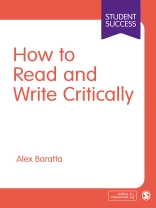To succeed in any assessment, you need to demonstrate critical thinking – but what does it mean to be ‘critical’?
This book takes a hands-on approach to helping you think, read and write critically. Packed with examples from different disciplines and subjects, it talks through dozens of written extracts so you can see what criticality actually looks like.
The book:
· Equips you with tools for making an argument, explaining your reasoning and using examples to illustrate your points.
· Enables you to structure coherent arguments and choose appropriate language.
· Helps you interpret and apply feedback from your lecturers.
For undergraduate students studying in any discipline, this clear guide takes the confusion out of reading and writing critically so you can approach your assessments with confidence.
Table of Content
Chapter 1: What does it mean to be ‘critical’?
Chapter 2: Different ways to show your criticality
Chapter 3: Understanding score bands and developing your skills within academic assessment
Chapter 4: The connection between critical reading, thinking and writing
Chapter 5: How to structure your essays
Chapter 6: How to structure your dissertation
Chapter 7: Additional assessments to consider
Chapter 8: Four ways to approach interpretation
Chapter 9: How to use quotes, paraphrase and summarise
Chapter 10: How to use critical language in your assessments
About the author
Alex Baratta is a Senior Lecturer at the University of Manchester, teaching within the Manchester Institute of Education. Here he runs a writing center – Write Away – for the School of Environment, Education and Development. His initial teaching experience was in EFL and academic writing, experiences he has brought to five books he has written which are focused on study skills, such as essay writing and critical thinking. He has taught in Korea, England and his native USA, and also researches language and identity, linguistic rights, and linguistic prejudice. Alex has also been published in prestigious journals, such as World Englishes, and presented his research at international conferences in South Africa, Australia and Singapore, to include acting as a keynote speaker for a linguistic prejudice conference at the University of Sheffield in 2018.












